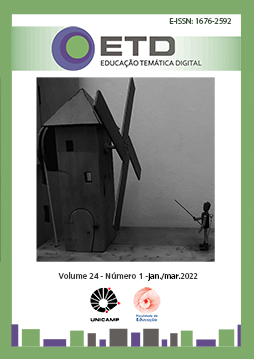Abstract
With the preventive measures adopted as a result of Covid-19, educational systems faced a restructuring that involved the sudden incorporation of digital technologies for the development of the teaching-learning process carried out exclusively in a virtual way. Thus, the article aimed to report the pedagogical experiences of a teacher, adapted for remote, synchronous and asynchronous teaching, from July 2020 to May 2021, in two higher education institutions, located in the state of Bahia. This is an exploratory, qualitative study, of the Experience Report type, elaborated through participant observation, whose analyzes took the form of a balance of activities carried out through digital technologies, such as Blackboard, Google Meet, Google Classroom, Socrative, Kahoot, Mentimeter and the Padlet. Authors such as Lévy (2005), Virilio (1997), Ortiz (2007), and Trindade and Moreira (2017), helped us to problematize the situation regarding access to information and communication technologies and remote teaching among us. It was possible to identify potentialities and challenges in the use of these technological tools, such as the development of students' autonomy, protagonism and engagement; the need for teacher training for the pedagogical use of Digital Information and Communication Technologies (TDIC), and public policies that make the acquisition of equipment and access to the Internet a right, so that thousands are not excluded from the educational process, collaborating to further deepen educational and social inequalities in contemporary Brazil.
References
BARBERIA, Lorena G.; CANTARELLI, Luiz G. R.; SCHMALZ, Pedro Henrique De Santana. Uma avaliação dos programas de educação pública remota dos estados e capitais brasileiros durante a pandemia do COVID-19. São Paulo, FGV / EESP: 2020. Disponível em: http://fgvclear.org/site/wp-content/uploads/remote-learning-in-the-covid-19-pandemic-v-1-0-portuguese-diagramado-1.pdf. Acesso em: mar. 2021.
GIL, Antônio Carlos. Como Elaborar Projetos de Pesquisa. 4. ed. São Paulo: Atlas, 2002.
GROLLMUS, Nicolás Schöngut; TARRÉS, Joan Pujol. Relatos metodológicos: difractando experiencias narrativas de investigación. Fórum Qualitative Social Research, v. 16, n. 2, 2015. Disponível em: https://www.qualitative-research.net/index.php/fqs/article/download/2207/3810. Acesso em: maio 2018.
INSTITUTO BRASILEIRO DE GEOGRAFIA E ESTATÍSTICA (IBGE). Pesquisa Nacional por Amostra de Domicílios Contínua - Tecnologia da Informação e Comunicação (PNAD / TIC). Brasília: 2018. Disponível em: https://www.ibge.gov.br/estatisticas/multidominio/condicoes-de-vida-desigualdade-e-pobreza/17270-pnad-continua.html?=&t=o-que-e. Acesso em: mar. 2019.
LARROYO, Francisco. História geral da pedagogia. São Paulo: Mestre Jou, 1970, v. 2.
LAVILLE, Christian; DIONNE, Jean. A construção do saber: Manual de metodologia da pesquisa em ciências humanas. Belo Horizonte: Editora UFMG; Porto Alegre: ARTMED, 1999.
LÉVY, Pierre. O que é o virtual? 7ª reimp. São Paulo: Editora 34.
MONTGOMERY, Kathryn C. Generation digital: politics, commerce, and childhood in the age of the internet. Cambridge: MIT Press, 2007.
ORTIZ, Renato. Mundialização e cultura. São Paulo: Brasiliense, 2007.
PRENSKY, Marc. Digital natives, digital immigrants. On the Horizon, v. 9, n. 5, 2001. p. 1-6. Disponível em: https://www.marcprensky.com/writing/Prensky%20-%20Digital%20Natives,%20Digital%20Immigrants%20-%20Part1.pdf. Acesso em: jun. 2021.
RICHARDSON, Roberto Jarry. Pesquisa social: Métodos e Técnicas. São Paulo: Atlas, 1985.
ROSEN, Larry D. Welcome to the iGeneration! Education Digest: Essential Readings Condensed for Quick Review, v. 75, n. 8, p. 8-12, 2010. Disponível em: https://www.researchgate.net/publication/234721196_Welcome_to_the_iGeneration. Acesso em: jun, 2021.
SILVA, Edna Alves Pereira da; ALVES, Doralice Leite Ribeiro; FERNANDES, Marinalva Nunes. O papel do professor e o uso das tecnologias educacionais em tempos de pandemia. Revista Cenas Educacionais, Caetité, v.4, n.10740, p.1-17, 2021.
SCHNEIDER, Henrique Nou. A Educação na era do conhecimento. In: SCHNEIDER, H. N. (Org.). Informática e Educação. Aracaju: SESI, 2011. p.31-60.
TRINDADE, Sara Dias; MOREIRA, J. António. A Emergência do Mobile Learning e os Novos Desafios Formativos para a Docência em Rede. In TORRES, Patrícia Lupion (Org.). Redes e mídias sociais. Curitiba: APPRIS Editora, 2017. 41-57 p.
TRIVINHO, Eugênio. Introdução à dromocracia cibercultural: contextualização sociodromológica da violência invisível da técnica e da civilização mediática avançada. Revista FAMECOS, Porto Alegre, v. 12, n. 28, p. 63-78, 2005. Disponível em: https://revistaseletronicas.pucrs.br/ojs/index.php/revistafamecos/article/view/3338/2595. Acesso em: jan. 2020.
VIRILIO, Paul. Velocidade e Política. São Paulo: Estação da Liberdade, 1996.

This work is licensed under a Creative Commons Attribution-NonCommercial-NoDerivatives 4.0 International License.
Copyright (c) 2022 ETD - Educação Temática Digital


